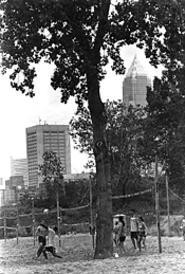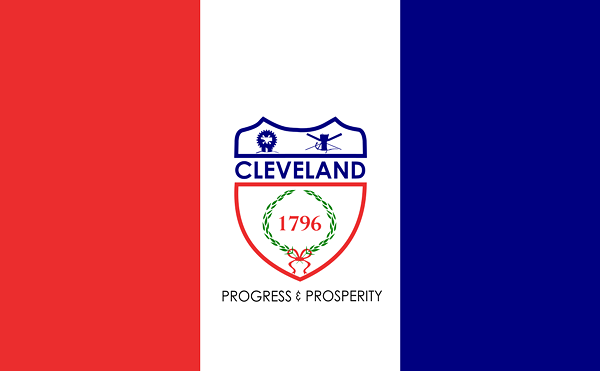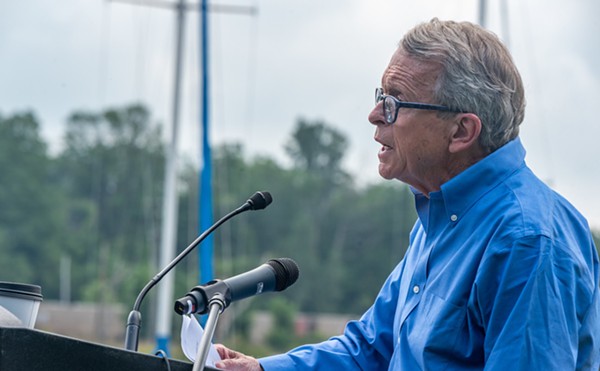By the time Dan Moore gets the floor at the Bourbon Street Grille, the crowd has already sat through 13 speakers. They're supposed to be outside, feting the Cuyahoga for the RiverDay 2003 celebration, but the skies interfere, with torrents of rain. The bar must suffice.
The crowd gets history lessons and lectures on the importance of citizen action. The word "ecosystem" is used early and often. After two hours of talk, everyone is tired.
But Moore isn't about to let them get away. Silver-haired, with a stubborn Irish jaw, he stands behind the bar, backed by tiers of rum and whiskey and a sign advertising $2 Jell-O shots.
"In a month," he announces, "this property could be gone."
The crowd stirs.
"The flag is up. We've got about two months, and this thing is over. We're going to lose the biggest piece of publicly accessible property on the lake." Moore is winding up like Ernest Angley, pitching no less than salvation itself. "And what are we going to get for it? The promise of something in the future."
The property in question is Whiskey Island, which isn't really an island at all. It's a peninsula, jutting east from Edgewater Park to the western mouth of the Cuyahoga. Other than the salt mines and a stone company, it's often forgotten, a product of its tortuous access route. To get here, you have to catch a bumpy little road snaking past Edgewater Yacht Club, drive past the wastewater treatment plant, and pull onto a gravel parking lot shared by the bar and Whiskey Island Marina.
The marina is open to the public, and so are the 20 acres to its east, a wild expanse of grass and birds and shrill lake winds. For those in the know, it's one of the best things in the city. Nearly 300 people come each weeknight to play in its eight volleyball pits -- most of them exactly the sort of young professionals Cleveland is eager to keep.
But, as Moore warns, all good things must come to an end. The grim reaper -- in this case, the city of Cleveland -- has been idling over various lakefront development plans for years. Suddenly, it has one it likes and wants it approved ASAP.
In the new plan, Whiskey Island is no longer the lakefront park that Mayor Jane Campbell promised last year. Instead, it's been slated for Port Authority docks and warehouses, with only its far eastern edge remaining a "riverfront promenade." In the words of Ed Hauser, a former LTV engineer who leads the Friends of Whiskey Island, "We've gone from a 20-acre park to Sliver Park."
Although the city portrays the plan as conceptual and incremental, its actions look serious. It's already drafted a "memorandum of understanding," under which the city would buy the land, then transfer it to the port. Councilman Matt Zone, a critic of the plan, says council will probably move on the idea in September.
"It is crunch time," Hauser says. "I love this place. It's been my playground for 10 years. And when I see this, and then look across the river and see a barren wasteland at the Port Authority . . ." His voice trails off; he's too bummed to finish the thought.
Theoretically, moving port operations isn't a terrible idea. The port's docks and storage space currently take up some of the city's best real estate, behind Browns Stadium. If the port moves west, planners envision a 100-acre utopia of condos, restaurants, and a harborfront park on the land it vacated.
The problem is cost. Port Director Gary Failor admits that constructing dock space for one 1,000-foot ship alone would cost $5.3 million. Plus, people like Hauser worry that the port will develop Whiskey Island, while the city won't have the money for -- much less get around to --creating a park on the land it left behind.
That's one reason that Moore, who owns a majority interest in the Whiskey Island property, is resistant. He's been informally looking for a buyer for five years, but he's not open to just anyone. "If I sell to the Port Authority, I make a hell of a lot of money," he says. "I don't want to sell to the Port Authority. Money's not as important as making this a park."
Moore does want to sell to the Trust for Public Land, a nonprofit aimed at keeping land public. The San Francisco group arranges financing for land sales, then typically hands off the acreage to governments for park use.
Christopher Knopf, director of the trust's Ohio office, hopes to execute a purchase agreement for the Whiskey Island site within a few weeks. The group will then try to line up financing to meet Moore's price, he says.
But an even more daunting task may be lining up the city. "The city is a necessary partner in this," Knopf admits.
Chris Ronayne, Cleveland's planning director, isn't exactly jumping for joy at Knopf's offer. He claims the city approached the trust last year and was rebuffed. (At that point, the city didn't have an entire plan in place, Knopf says.)
Now the city has found a new partner in the Port Authority. Ronayne cautions against a small-picture view: "We're going to get 100 acres of harborfront, a riverfront park on Whiskey Island, and a connection to the Towpath. That's a big deal. We can have our cake and eat it too."
The city-port agreement calls for the Whiskey Island Marina to stay open at least three years, he adds. "We're going to continue to have conversations about where we want marina space and how much of it."
That isn't enough for the boaters and volleyballers devoted to saving the island. Hauser, who's been fighting to spare Whiskey Island from industry for five years, has some important supporters, such as Zone and County Commissioner Tim McCormack. Still, politicians are only as strong as the public outcry.
"The mayor of Cleveland is badly mistaken in not wanting this to be a park," Knopf tells the crowd on RiverDay, as the damp masses huddled around the bar erupt into cheers. "And the mayor needs to hear that, and hear that now."













